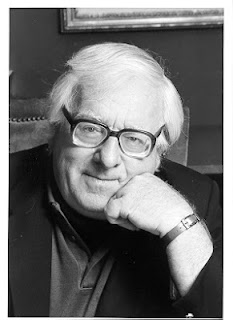Ray Bradbury, long known as "the world's greatest living science fiction writer", has left this world at the age of 91. The news of his passing bears a particular poignance for me, as his tremendous literary talents had exerted an incalculable influence on my imagination starting at the age of 7, and ever since he has maintained a consistent place among my favorite and most esteemed authors.
I was first introduced to Ray Bradbury in the fall of 1978, when my father showed me the Heritage Book Club edition of The Martian Chronicles. The magical illustrations by Joseph Mugnaini certainly helped to stoke my fascination, but above all it was Bradbury's words and stories and the strange, wondrous worlds they conjured up that captured my young mind, and that played a large part in inspiring me to become a writer.
Throughout my adolescence and adult life I read many more stories by Bradbury, in addition to revisiting The Martian Chronicles. I came to feel that the well-intended epithet "world's greatest living science fiction writer" did not in fact do him the greatest service. Even though Mr. Bradbury was perhaps more responsible than anyone else both for popularizing science fiction (pushing it beyond the domain of a few SF nerds) and also for making it respectable to devotees of "serious" literary fiction--both feats due to his deeply humane and poetic style that dealt with real human issues and feelings rather than technical details--he was not exclusively, nor even primarily, a science fiction writer. He preferred to think of himself as a fantasist, but in reality his work spans a wide range of genres and subject matters.
In addition to stories about the exploration and colonization of Mars, depicting crassly materialistic Earth people's encounters with a dying race of noble Martians, and other outer space and futuristic tales, Bradbury also wrote a large number of gothic tales (e.g., the stories collected in Dark Carnival and The October Country, as well as the novel Something Wicked This Way Comes), nostalgic and wondrous stories inspired by his childhood in 1920s Illinois (especially Dandelion Wine), stories set in Mexico, and a number of other stories that can only be described as realistic fiction, about ordinary people in the real world. His stories are often punctuated by bitterly ironic humor but also by bittersweet longing, and always by a marvelous sense of wonder at the endlessly amazing, mysterious, and miraculous universe in which we find ourselves.
Most readers agree that Bradbury's greatest and most significant work is his 1953 novel Fahrenheit 451, named for the temperature at which book paper burns. Although it is widely known as a dystopian work decrying the evils of censorship, I realized upon reading it for the first time that it is more about a society which has become shallow, a world in which the masses lead superficial lives distracted by electronic entertainments and hectic lifestyles. Book burning is almost an afterthought, since very few people in this society bother to read anymore anyway. Nevertheless, the main character, Montag, whose job as a "fireman" is to go around destroying the remaining illegal stashes of books, discovers the existence of an underground subculture made up of people who not only read books, but also take the time to have real, meaningful conversations and to enjoy the simple beauties of the natural world. The ending of Francois Truffaut's 1966 film version makes the ending of Bradbury's novel especially moving when it shows a succession of book lovers, hiding away in the woods, reciting great works of literature that they have committed to memory, in an inspiring and magnificent effort to preserve these cultural treasures for future generations. In the process, each one takes on the identity of the book he/she has memorized... "I am Moby Dick", "I am Great Expectations", etc. It is enough to make any bibliophile choke up.
Many film and television adaptations have been produced of Bradbury's works, but it has become almost a truism to say that it is impossible to capture the full magic of his writing on screen. You have to read his books to really get it. Aldous Huxley, author of Brave New World, paid Bradbury a high compliment by calling him "a poet". Although Bradbury has written actual verse poems, Huxley no doubt meant this to refer to Bradbury's writing as a whole, which of course has been dominated by fiction. Many others have noted and appreciated the poetic style of Bradbury's writing--some dismissing his style as overly florid, while his unnumbered fans admire the evocative beauty and richness and lyricism of his distinctive language. In the larger sense of the term, Bradbury was indeed a poet, a writer of immense imagination and vision, who easily and naturally perceived the magic and wonder of the world we live in and who was blessed with an incredible talent for communicating that vision to the rest of us. So, while it is no insult to call him a science fiction writer (a genre that he, after all, helped to make respectable), it is important to note that he is far more than that.
Or perhaps, since one adjective in the epithet cited at the top of this post no longer applies, perhaps we can now just call him "the world's greatest science fiction writer".
* * * *
So long, Ray, and thank you for sharing with us your wonderful talent and imagination, in themselves miracles as amazing as anything you told us about in your marvelous tales. To paraphrase a line from the Chronicles: "Your bibliography is beautifully complete."
Raymond Douglas Bradbury
American author
1920 - 2012



No comments:
Post a Comment